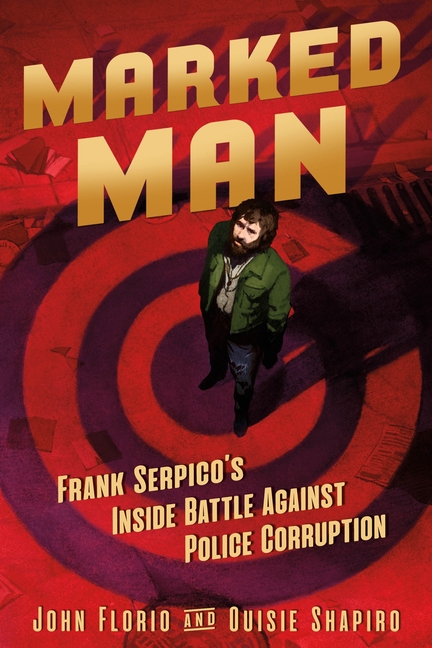
Book Resume
for Marked Man: Frank Serpico's Inside Battle Against Police Corruption by John Florio and Ouisie Shapiro
Professional book information and credentials for Marked Man.
4 Professional Reviews (2 Starred)
2 Book Awards
Selected for 1 State/Province List
See full Book Resume
on TeachingBooks
- School Library Journal:
- Grades 10 and up
- Booklist:
- Grades 7 - 10
- Kirkus:
- Ages 12 and up
- Publisher's Weekly:
- Ages 12 and up
- TeachingBooks:*
- Grades 7-12
- Year Published:
- 2024
3 Subject Headings
The following 3 subject headings were determined by the U.S. Library of Congress and the Book Industry Study Group (BISAC) to reveal themes from the content of this book (Marked Man).
4 Full Professional Reviews (2 Starred)
The following unabridged reviews are made available under license from their respective rights holders and publishers. Reviews may be used for educational purposes consistent with the fair use doctrine in your jurisdiction, and may not be reproduced or repurposed without permission from the rights holders.
Note: This section may include reviews for related titles (e.g., same author, series, or related edition).
From School Library Journal
Starred review from July 19, 2024
Gr 10 Up-Frank Serpico stood up for what he knew was right, and if that meant taking down the New York City police department, so be it. He became a marked man because of it. Florio and Shapiro bring readers into the world of policing in the late 1960s and early 1970s and the massive corruption that was deeply entrenched in everyday interactions with businesses and the public. Enter Serpico, a cop with a moral compass and a strong will to put an end to shady dealings. What could go wrong? While there is plenty of media coverage about Serpico's fight, including a 1973 movie starring Al Pacino, here a younger audience can catch a glimpse of a different time and place vividly described by veteran authors of nonfiction for teens. Names and dates aside, what the two deliver is a profile of a man who knew right from wrong but had to be unpopular to set things right. Skillfully navigating this gray area with Serpico's own words and the documented actions, cases, and convictions, this book is a pillar to narrative nonfiction. Cutting out the extraneous details and highlighting the adage that truth is stranger than fiction, riveting details are added with text features and photographs enhancing the whole story without making a judgement on the facts. Whether it's an interest in law enforcement, criminality, or morality, the book captivates and almost feels too short. VERDICT Purchasing for a teen nonfiction collection is an easy decision and selling it to teens will be even easier with its focus on money, power, and greed.-Alicia Abdul
Copyright 2024 School Library Journal, LLC Used with permission.
From Booklist
February 1, 2024
Grades 7-10 Florio and Shapiro's (Doomed: Sacco, Vanzetti & the End of the American Dream, 2023) latest collaboration follows one honest cop who exposed the shocking corruption of the NYC police department in the 1960s and '70s. They begin on the night in 1971 when Frank Serpico was shot by a suspect, before backtracking to 1940s Brooklyn, where he grew up dreaming of becoming a policeman. In 1960, Serpico's first partner showed him how to accept bribes. He refused. In a city where narcotics dealers and gambling bosses routinely paid millions of dollars a year to policemen, he was ostracized. Each time he urged his superiors to take action against corrupt cops, he was stonewalled, transferred, or threatened. And that shooting--was it a setup? Finally, a New York Times investigation and Serpico's 1971 Knapp Commission testimony led to department-wide reforms and arrests. The authors center their account on several recent interviews with their subject and include interstitials in Serpico's own words. This careful account incorporates black-and-white photographs, sidebars, source notes, and an extensive bibliography.
COPYRIGHT(2024) Booklist, ALL RIGHTS RESERVED.
From Kirkus
Starred review from January 15, 2024
A profile of the maverick undercover officer who exposed widespread corruption in the New York City Police Department. In this concise work, readers get an overview of the colorful lifestyle of Italian American Frank Serpico, who was played by Al Pacino in the 1973 movie Serpico. The authors add substantial passages from original interviews with their subject, offering clear senses of both his personal voice and his stubborn idealism; they recount how his refusal to participate in widespread payoffs as a cop in the late '60s and early '70s had him continually being transferred from precinct to precinct like a hot potato--until he was shot during a drug bust in what may have been a setup and forced to retire on a disability pension. What comes through loud and clear is that what finally prompted him to go to the papers with his story was his inability to get anything for his testimony but platitudes and promises from city officials. The ensuing scandal resulted in reforms and some changes in government attitudes and police culture, but those with even a tangential awareness of current events will come away agreeing with the assessment of this still-proud whistleblower (or, to use his preferred term, lamplighter) that the "blue wall of silence" and official complicity are still shielding too many injustices to preserve public confidence in the probity of our police. Gritty and inspiring, if light on specific details. (note to readers, glossary, source notes, bibliography, image credits, index) (Nonfiction. 12-18)
COPYRIGHT(2024) Kirkus Reviews, ALL RIGHTS RESERVED.
From Publisher's Weekly
January 8, 2024
In a first-person POV preface, which briefly introduces why Frank Serpico (b. 1936) is still persona non grata in the NYPD, previous collaborators Florio and Shapiro (Doomed) write, "Open your mouth, and you're no longer one of us.... I opened my mouth." This edge-of-the-seat read chronicles Serpico's becoming a New York City police officer in the 1960s and the pervasive corruption he found therein. Via gritty, rapid-fire prose, the creators detail instances of cops taking bribes and organizing deals with gambling dens, actions that Serpico refused to participate in or look away from. During his tenure, he reached out to mayoral officials and reporters, hoping to shed light on the unscrupulous goings-on, and in April 1970, the New York Times published an exposé of Serpico's findings, resulting in the convictions of numerous dirty cops. But because he testified, Serpico was ostracized by his peers and, many believe, ultimately "set up" to be shot during a drug raid, an event that forced him into retirement. This riveting tale of an intrepid whistleblower highlights a long history of corruption in the NYPD and offers lessons in remaining true to oneself and one's values, even if it means standing alone. Ages 12â€"up.
2 Book Awards & Distinctions
Marked Man was recognized by committees of professional librarians and educators for the following book awards and distinctions.
1 Selection for State & Provincial Recommended Reading Lists
Marked Man was selected by educational and library professionals to be included on the following state/provincial reading lists.
United States Lists (1)
Preview Digital Book
Explore Marked Man on Marketplace. Access requires OverDrive Marketplace login.
This Book Resume for Marked Man is compiled from TeachingBooks, a library of professional resources about children's and young adult books. This page may be shared for educational purposes and must include copyright information. Reviews are made available under license from their respective rights holders and publishers.
*Grade levels are determined by certified librarians utilizing editorial reviews and additional materials. Relevant age ranges vary depending on the learner, the setting, and the intended purpose of a book.
Retrieved from TeachingBooks on January 19, 2025. © 2001-2025 TeachingBooks.net, LLC. All rights reserved by rights holders.


 Junior Library Guild Selections, 2012-2024, Biography Selection, 2024
Junior Library Guild Selections, 2012-2024, Biography Selection, 2024
 SLJ Best Books of the Year, 2010 - 2024, Selection, 2024
SLJ Best Books of the Year, 2010 - 2024, Selection, 2024
